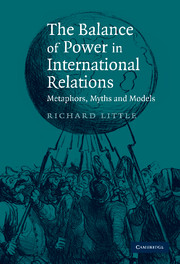Book contents
- Frontmatter
- Contents
- List of figures
- Acknowledgements
- Part I Introduction
- Part II Metaphors, myths and models
- Part III Balance of power models
- 4 Hans J. Morgenthau's Politics Among Nations
- 5 Hedley Bull's The Anarchical Society
- 6 Kenneth N. Waltz's Theory of International Politics
- 7 John J. Mearsheimer's The Tragedy of Great Power Politics
- Part IV Conclusion
- Bibliography
- Index
7 - John J. Mearsheimer's The Tragedy of Great Power Politics
Published online by Cambridge University Press: 05 October 2014
- Frontmatter
- Contents
- List of figures
- Acknowledgements
- Part I Introduction
- Part II Metaphors, myths and models
- Part III Balance of power models
- 4 Hans J. Morgenthau's Politics Among Nations
- 5 Hedley Bull's The Anarchical Society
- 6 Kenneth N. Waltz's Theory of International Politics
- 7 John J. Mearsheimer's The Tragedy of Great Power Politics
- Part IV Conclusion
- Bibliography
- Index
Summary
One of the remarkable developments in the study of international politics since the cold war came to an end has been the resurgence of interest in realism. In the flush of optimism that accompanied the emergence of the post-cold war era a range of theorists assumed, or at least hoped, that the ‘end of history’ would include the death of realism. Instead, a new generation of realists came on to the scene and during the 1990s opened up a series of debates about the nature of realist theory. Some of this new generation followed in Waltz's footsteps, but others moved off in other directions. At the start of the new millennium, John Mearsheimer, drawing on this ferment of new thinking, produced The Tragedy of Great Power Politics, a book that was immediately hailed as a classic that deserved to supersede the works of Morgenthau and Waltz ‘in the core canon of realist literature’. As in the previous chapters, it is argued here that the balance of power plays a central role in Mearsheimer's theory of international politics. Mearsheimer makes it very explicit that it is essential to draw on balance of power logic to understand international politics. But he has a very distinctive assessment of the balance of power and one that places him some distance from Morgenthau, Bull and Waltz. Their theories all identify circumstances where great powers can move beyond zero-sum conflict and into a space where collaboration is at least possible.
- Type
- Chapter
- Information
- The Balance of Power in International RelationsMetaphors, Myths and Models, pp. 213 - 248Publisher: Cambridge University PressPrint publication year: 2007



